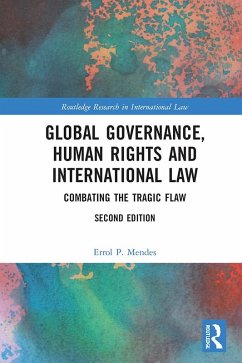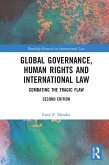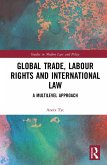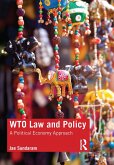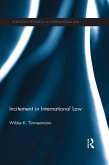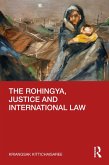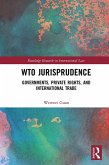Errol P. Mendes
Global Governance, Human Rights and International Law (eBook, ePUB)
Combating the Tragic Flaw
41,95 €
41,95 €
inkl. MwSt.
Sofort per Download lieferbar

21 °P sammeln
41,95 €
Als Download kaufen

41,95 €
inkl. MwSt.
Sofort per Download lieferbar

21 °P sammeln
Jetzt verschenken
Alle Infos zum eBook verschenken
41,95 €
inkl. MwSt.
Sofort per Download lieferbar
Alle Infos zum eBook verschenken

21 °P sammeln
Errol P. Mendes
Global Governance, Human Rights and International Law (eBook, ePUB)
Combating the Tragic Flaw
- Format: ePub
- Merkliste
- Auf die Merkliste
- Bewerten Bewerten
- Teilen
- Produkt teilen
- Produkterinnerung
- Produkterinnerung

Bitte loggen Sie sich zunächst in Ihr Kundenkonto ein oder registrieren Sie sich bei
bücher.de, um das eBook-Abo tolino select nutzen zu können.
Hier können Sie sich einloggen
Hier können Sie sich einloggen
Sie sind bereits eingeloggt. Klicken Sie auf 2. tolino select Abo, um fortzufahren.

Bitte loggen Sie sich zunächst in Ihr Kundenkonto ein oder registrieren Sie sich bei bücher.de, um das eBook-Abo tolino select nutzen zu können.
This second edition of the book is a unique introduction to the links between different areas of global governance, human rights and the global economy.
- Geräte: eReader
- ohne Kopierschutz
- eBook Hilfe
- Größe: 0.87MB
Andere Kunden interessierten sich auch für
![Global Governance, Human Rights and International Law (eBook, PDF) Global Governance, Human Rights and International Law (eBook, PDF)]() Errol P. MendesGlobal Governance, Human Rights and International Law (eBook, PDF)41,95 €
Errol P. MendesGlobal Governance, Human Rights and International Law (eBook, PDF)41,95 €![Global Trade, Labour Rights and International Law (eBook, ePUB) Global Trade, Labour Rights and International Law (eBook, ePUB)]() Aneta TycGlobal Trade, Labour Rights and International Law (eBook, ePUB)39,95 €
Aneta TycGlobal Trade, Labour Rights and International Law (eBook, ePUB)39,95 €![WTO Law and Policy (eBook, ePUB) WTO Law and Policy (eBook, ePUB)]() Jae SundaramWTO Law and Policy (eBook, ePUB)45,95 €
Jae SundaramWTO Law and Policy (eBook, ePUB)45,95 €![Emerging Pathogens at the Poles (eBook, ePUB) Emerging Pathogens at the Poles (eBook, ePUB)]() Alexandra L. CarletonEmerging Pathogens at the Poles (eBook, ePUB)19,95 €
Alexandra L. CarletonEmerging Pathogens at the Poles (eBook, ePUB)19,95 €![Incitement in International Law (eBook, ePUB) Incitement in International Law (eBook, ePUB)]() Wibke K. TimmermannIncitement in International Law (eBook, ePUB)49,95 €
Wibke K. TimmermannIncitement in International Law (eBook, ePUB)49,95 €![The Rohingya, Justice and International Law (eBook, ePUB) The Rohingya, Justice and International Law (eBook, ePUB)]() Kriangsak KittichaisareeThe Rohingya, Justice and International Law (eBook, ePUB)41,95 €
Kriangsak KittichaisareeThe Rohingya, Justice and International Law (eBook, ePUB)41,95 €![WTO Jurisprudence (eBook, ePUB) WTO Jurisprudence (eBook, ePUB)]() Wenwei GuanWTO Jurisprudence (eBook, ePUB)41,95 €
Wenwei GuanWTO Jurisprudence (eBook, ePUB)41,95 €-
-
-
This second edition of the book is a unique introduction to the links between different areas of global governance, human rights and the global economy.
Dieser Download kann aus rechtlichen Gründen nur mit Rechnungsadresse in A, B, BG, CY, CZ, D, DK, EW, E, FIN, F, GR, HR, H, IRL, I, LT, L, LR, M, NL, PL, P, R, S, SLO, SK ausgeliefert werden.
Produktdetails
- Produktdetails
- Verlag: Taylor & Francis
- Seitenzahl: 302
- Erscheinungstermin: 18. August 2022
- Englisch
- ISBN-13: 9781000578379
- Artikelnr.: 64249935
- Verlag: Taylor & Francis
- Seitenzahl: 302
- Erscheinungstermin: 18. August 2022
- Englisch
- ISBN-13: 9781000578379
- Artikelnr.: 64249935
- Herstellerkennzeichnung Die Herstellerinformationen sind derzeit nicht verfügbar.
Errol P. Mendes is a lawyer, author, professor, and has been an advisor to governments, corporations, civil society groups, and the United Nations in the areas of international law human rights, and global governance. He is the author and/or editor of eleven books dealing with the subjects as diverse as global governance, international human rights, labour standards, the International Criminal Court, and the Canadian Charter of Rights and Freedoms. He has also served as a Visiting Professional at the International Criminal Court in 2009. He was appointed as a Visiting Fellow at Harvard Law School in 2013 and a Visiting Scholar at Oxford University in 2021. He is a full professor of law at the University of Ottawa and President of the International Commission of Jurists, Canada.
CHAPTER 1
1. Combating the tragic flaw in the UN
1. The contested history of sovereignty and the promise of the Atlantic
Charter
2. Birth of the United Nations: One step forward, two steps back
3. The evolution of the International Bill of Rights: rekindling the age
of hope
4. U.N. legal standard-setting in human rights: more law, but less moral
force
5. Genocide, the Cold War and complicity: the age of hypocrisy
6. The regional human rights regime in Europe: is the wait for justice
over for Europe and
is it a model for the rest of the world?
7. The regional human rights system in the Americas
8. Human rights regional mechanisms in the Asia-Pacific regions
9. The African human rights system
10. After the Cold War: the era of television wars, genocides and virtual
guilt
11. The Kosovo crisis, universal jurisdiction and the International
Criminal Court:
turning points in the hold of the tragic flaw?
12. Universal jurisdiction; a success or failure in reducing the hold of
the tragic flaw?
13. The International Criminal Court; sovereign powers uniting in the
fight against
impunity for the most serious international crimes.
14. The responsibility to protect and the protection of civilians; the
new normative
core of sovereignty as the legitimate exercise of power?
15. Conclusion: A Hegelian dialectic on the road to global justice and
human right?
16. The "war on terror" and a re-invigorated tragic flaw
2. Seeking justice in global trade and economy
2.1 The evolution of the world trade regime; another area of global
governance, another
tragic flaw.
2.2 Who and what killed the Doha Development Round?
2.3 The global trade regime; can it assist in promoting human rights and
justice for the
global labour force?
2.3.1 Debating the duty to promote justice and fairness for the global
labour force
between the WTO and the ILO
2.3.2 The ILO attempts to strengthen justice and fairness for the global
labour force
2.3.3 Searching for the original vision of justice and human rights for
global labour in
the ITO; Can labour standards provisions in bilateral free trade agreements
play
a part?
2.4 In the long term do we survive? Trading off the environment.
2.5. Conclusion: solving the democratic deficit: a critical part of the
long term
solution
2.6 The evolution and failures of the global financial system: a growing
tragic flaw that
undermines fundamental principles of justice and human rights
2.6.1 The Bretton Woods System: the global financial system counterpart of
the
Atlantic Charter
2.6.2 The financial tragic flaw undermines the Bretton Woods vision
2.6.3 The tragic flaws in the Bretton Woods system triggers recurrent
global financial
crises and the urgent reforms to combat the tragic flaws
2.7. Conclusion: massive winners that thrive on the tragic flaws drive
massive inequality
and instability in the global trade and financial systems
3. Corporate power and human rights
1. The transformation of global economic power: in search of power with
responsibility.
3.2 Case studies where corporate power is exercised without responsibility
3.2.1 Corruption
3.2.2 The health and safety of local communities: Bophal almost half a
century later as a case
study.
3.2.3 The environmental impact of corporate activities: The failed $9.5
billion claim for damages
against Texaco/Chevron for environmental damage in Ecuador
3.2.4 The human rights impact of global private sector activities; a case
study of Shell in Nigeria
3.3 The abuse of corporate Power: a direct or indirect role for
international law?
3.4 Moving from the absence of hard law to soft law: the Ruggie Framework
3.4.1 The state's duty to protect
3.4.2 The corporate responsibility to respect
3.4.3 Access to an effective remedy
3.5 Human rights and corporate social responsibility in the global economy
3.5.1 Corporate codes
3.5.2 Sectorial and industry-wide initiatives (involving coalitions from
civil society, states and the
private sector)
3.5.3 Multi-stakeholder transnational Initiatives
3.5.4 Global guidelines, standards and initiatives for corporate social
responsibilities
3.5.5 Initiatives by multilateral organizations
3.6 The international legal duties of corporate officials and the global
MNEs.
3.7. Conclusion; The MNE as the main beneficiary of globalization and
global governance: why
the gap between power and responsibility must be bridged
4. The foundations of global pluralism as the next stage of global
governance
1. Combating the tragic flaw in the UN
1. The contested history of sovereignty and the promise of the Atlantic
Charter
2. Birth of the United Nations: One step forward, two steps back
3. The evolution of the International Bill of Rights: rekindling the age
of hope
4. U.N. legal standard-setting in human rights: more law, but less moral
force
5. Genocide, the Cold War and complicity: the age of hypocrisy
6. The regional human rights regime in Europe: is the wait for justice
over for Europe and
is it a model for the rest of the world?
7. The regional human rights system in the Americas
8. Human rights regional mechanisms in the Asia-Pacific regions
9. The African human rights system
10. After the Cold War: the era of television wars, genocides and virtual
guilt
11. The Kosovo crisis, universal jurisdiction and the International
Criminal Court:
turning points in the hold of the tragic flaw?
12. Universal jurisdiction; a success or failure in reducing the hold of
the tragic flaw?
13. The International Criminal Court; sovereign powers uniting in the
fight against
impunity for the most serious international crimes.
14. The responsibility to protect and the protection of civilians; the
new normative
core of sovereignty as the legitimate exercise of power?
15. Conclusion: A Hegelian dialectic on the road to global justice and
human right?
16. The "war on terror" and a re-invigorated tragic flaw
2. Seeking justice in global trade and economy
2.1 The evolution of the world trade regime; another area of global
governance, another
tragic flaw.
2.2 Who and what killed the Doha Development Round?
2.3 The global trade regime; can it assist in promoting human rights and
justice for the
global labour force?
2.3.1 Debating the duty to promote justice and fairness for the global
labour force
between the WTO and the ILO
2.3.2 The ILO attempts to strengthen justice and fairness for the global
labour force
2.3.3 Searching for the original vision of justice and human rights for
global labour in
the ITO; Can labour standards provisions in bilateral free trade agreements
play
a part?
2.4 In the long term do we survive? Trading off the environment.
2.5. Conclusion: solving the democratic deficit: a critical part of the
long term
solution
2.6 The evolution and failures of the global financial system: a growing
tragic flaw that
undermines fundamental principles of justice and human rights
2.6.1 The Bretton Woods System: the global financial system counterpart of
the
Atlantic Charter
2.6.2 The financial tragic flaw undermines the Bretton Woods vision
2.6.3 The tragic flaws in the Bretton Woods system triggers recurrent
global financial
crises and the urgent reforms to combat the tragic flaws
2.7. Conclusion: massive winners that thrive on the tragic flaws drive
massive inequality
and instability in the global trade and financial systems
3. Corporate power and human rights
1. The transformation of global economic power: in search of power with
responsibility.
3.2 Case studies where corporate power is exercised without responsibility
3.2.1 Corruption
3.2.2 The health and safety of local communities: Bophal almost half a
century later as a case
study.
3.2.3 The environmental impact of corporate activities: The failed $9.5
billion claim for damages
against Texaco/Chevron for environmental damage in Ecuador
3.2.4 The human rights impact of global private sector activities; a case
study of Shell in Nigeria
3.3 The abuse of corporate Power: a direct or indirect role for
international law?
3.4 Moving from the absence of hard law to soft law: the Ruggie Framework
3.4.1 The state's duty to protect
3.4.2 The corporate responsibility to respect
3.4.3 Access to an effective remedy
3.5 Human rights and corporate social responsibility in the global economy
3.5.1 Corporate codes
3.5.2 Sectorial and industry-wide initiatives (involving coalitions from
civil society, states and the
private sector)
3.5.3 Multi-stakeholder transnational Initiatives
3.5.4 Global guidelines, standards and initiatives for corporate social
responsibilities
3.5.5 Initiatives by multilateral organizations
3.6 The international legal duties of corporate officials and the global
MNEs.
3.7. Conclusion; The MNE as the main beneficiary of globalization and
global governance: why
the gap between power and responsibility must be bridged
4. The foundations of global pluralism as the next stage of global
governance
CHAPTER 1
- Combating the tragic flaw in the UN
- The contested history of sovereignty and the promise of the Atlantic Charter
- Birth of the United Nations: One step forward, two steps back
- The evolution of the International Bill of Rights: rekindling the age of hope
- U.N. legal standard-setting in human rights: more law, but less moral force
- Genocide, the Cold War and complicity: the age of hypocrisy
- The regional human rights regime in Europe: is the wait for justice over for Europe and
- The regional human rights system in the Americas
- Human rights regional mechanisms in the Asia-Pacific regions
- The African human rights system
- After the Cold War: the era of television wars, genocides and virtual guilt
- The Kosovo crisis, universal jurisdiction and the International Criminal Court:
- Universal jurisdiction; a success or failure in reducing the hold of the tragic flaw?
- The International Criminal Court; sovereign powers uniting in the fight against
- The responsibility to protect and the protection of civilians; the new normative
- Conclusion: A Hegelian dialectic on the road to global justice and human right?
- The "war on terror" and a re-invigorated tragic flaw
- Seeking justice in global trade and economy
- Corporate power and human rights
- The transformation of global economic power: in search of power with
is it a model for the rest of the world?
turning points in the hold of the tragic flaw?
impunity for the most serious international crimes.
core of sovereignty as the legitimate exercise of power?
2.1 The evolution of the world trade regime; another area of global governance, another
tragic flaw.
2.2 Who and what killed the Doha Development Round?
2.3 The global trade regime; can it assist in promoting human rights and justice for the
global labour force?
2.3.1 Debating the duty to promote justice and fairness for the global labour force
between the WTO and the ILO
2.3.2 The ILO attempts to strengthen justice and fairness for the global labour force
2.3.3 Searching for the original vision of justice and human rights for global labour in
the ITO; Can labour standards provisions in bilateral free trade agreements play
a part?
2.4 In the long term do we survive? Trading off the environment.
2.5. Conclusion: solving the democratic deficit: a critical part of the long term
solution
2.6 The evolution and failures of the global financial system: a growing tragic flaw that
undermines fundamental principles of justice and human rights
2.6.1 The Bretton Woods System: the global financial system counterpart of the
Atlantic Charter
2.6.2 The financial tragic flaw undermines the Bretton Woods vision
2.6.3 The tragic flaws in the Bretton Woods system triggers recurrent global financial
crises and the urgent reforms to combat the tragic flaws
2.7. Conclusion: massive winners that thrive on the tragic flaws drive massive inequality
and instability in the global trade and financial systems
responsibility.
3.2 Case studies where corporate power is exercised without responsibility
3.2.1 Corruption
3.2.2 The health and safety of local communities: Bophal almost half a century later as a case
study.
3.2.3 The environmental impact of corporate activities: The failed $9.5 billion claim for damages
against Texaco/Chevron for environmental damage in Ecuador
3.2.4 The human rights impact of global private sector activities; a case study of Shell in Nigeria
3.3 The abuse of corporate Power: a direct or indirect role for
international law?
3.4 Moving from the absence of hard law to soft law: the Ruggie Framework
3.4.1 The state's duty to protect
3.4.2 The corporate responsibility to respect
3.4.3 Access to an effective remedy
3.5 Human rights and corporate social responsibility in the global economy
3.5.1 Corporate codes
3.5.2 Sectorial and industry-wide initiatives (involving coalitions from civil society, states and the
private sector)
3.5.3 Multi-stakeholder transnational Initiatives
3.5.4 Global guidelines, standards and initiatives for corporate social responsibilities
3.5.5 Initiatives by multilateral organizations
3.6 The international legal duties of corporate officials and the global MNEs.
3.7. Conclusion; The MNE as the main beneficiary of globalization and global governance: why
the gap between power and responsibility must be bridged
4. The foundations of global pluralism as the next stage of global governance
CHAPTER 1
1. Combating the tragic flaw in the UN
1. The contested history of sovereignty and the promise of the Atlantic
Charter
2. Birth of the United Nations: One step forward, two steps back
3. The evolution of the International Bill of Rights: rekindling the age
of hope
4. U.N. legal standard-setting in human rights: more law, but less moral
force
5. Genocide, the Cold War and complicity: the age of hypocrisy
6. The regional human rights regime in Europe: is the wait for justice
over for Europe and
is it a model for the rest of the world?
7. The regional human rights system in the Americas
8. Human rights regional mechanisms in the Asia-Pacific regions
9. The African human rights system
10. After the Cold War: the era of television wars, genocides and virtual
guilt
11. The Kosovo crisis, universal jurisdiction and the International
Criminal Court:
turning points in the hold of the tragic flaw?
12. Universal jurisdiction; a success or failure in reducing the hold of
the tragic flaw?
13. The International Criminal Court; sovereign powers uniting in the
fight against
impunity for the most serious international crimes.
14. The responsibility to protect and the protection of civilians; the
new normative
core of sovereignty as the legitimate exercise of power?
15. Conclusion: A Hegelian dialectic on the road to global justice and
human right?
16. The "war on terror" and a re-invigorated tragic flaw
2. Seeking justice in global trade and economy
2.1 The evolution of the world trade regime; another area of global
governance, another
tragic flaw.
2.2 Who and what killed the Doha Development Round?
2.3 The global trade regime; can it assist in promoting human rights and
justice for the
global labour force?
2.3.1 Debating the duty to promote justice and fairness for the global
labour force
between the WTO and the ILO
2.3.2 The ILO attempts to strengthen justice and fairness for the global
labour force
2.3.3 Searching for the original vision of justice and human rights for
global labour in
the ITO; Can labour standards provisions in bilateral free trade agreements
play
a part?
2.4 In the long term do we survive? Trading off the environment.
2.5. Conclusion: solving the democratic deficit: a critical part of the
long term
solution
2.6 The evolution and failures of the global financial system: a growing
tragic flaw that
undermines fundamental principles of justice and human rights
2.6.1 The Bretton Woods System: the global financial system counterpart of
the
Atlantic Charter
2.6.2 The financial tragic flaw undermines the Bretton Woods vision
2.6.3 The tragic flaws in the Bretton Woods system triggers recurrent
global financial
crises and the urgent reforms to combat the tragic flaws
2.7. Conclusion: massive winners that thrive on the tragic flaws drive
massive inequality
and instability in the global trade and financial systems
3. Corporate power and human rights
1. The transformation of global economic power: in search of power with
responsibility.
3.2 Case studies where corporate power is exercised without responsibility
3.2.1 Corruption
3.2.2 The health and safety of local communities: Bophal almost half a
century later as a case
study.
3.2.3 The environmental impact of corporate activities: The failed $9.5
billion claim for damages
against Texaco/Chevron for environmental damage in Ecuador
3.2.4 The human rights impact of global private sector activities; a case
study of Shell in Nigeria
3.3 The abuse of corporate Power: a direct or indirect role for
international law?
3.4 Moving from the absence of hard law to soft law: the Ruggie Framework
3.4.1 The state's duty to protect
3.4.2 The corporate responsibility to respect
3.4.3 Access to an effective remedy
3.5 Human rights and corporate social responsibility in the global economy
3.5.1 Corporate codes
3.5.2 Sectorial and industry-wide initiatives (involving coalitions from
civil society, states and the
private sector)
3.5.3 Multi-stakeholder transnational Initiatives
3.5.4 Global guidelines, standards and initiatives for corporate social
responsibilities
3.5.5 Initiatives by multilateral organizations
3.6 The international legal duties of corporate officials and the global
MNEs.
3.7. Conclusion; The MNE as the main beneficiary of globalization and
global governance: why
the gap between power and responsibility must be bridged
4. The foundations of global pluralism as the next stage of global
governance
1. Combating the tragic flaw in the UN
1. The contested history of sovereignty and the promise of the Atlantic
Charter
2. Birth of the United Nations: One step forward, two steps back
3. The evolution of the International Bill of Rights: rekindling the age
of hope
4. U.N. legal standard-setting in human rights: more law, but less moral
force
5. Genocide, the Cold War and complicity: the age of hypocrisy
6. The regional human rights regime in Europe: is the wait for justice
over for Europe and
is it a model for the rest of the world?
7. The regional human rights system in the Americas
8. Human rights regional mechanisms in the Asia-Pacific regions
9. The African human rights system
10. After the Cold War: the era of television wars, genocides and virtual
guilt
11. The Kosovo crisis, universal jurisdiction and the International
Criminal Court:
turning points in the hold of the tragic flaw?
12. Universal jurisdiction; a success or failure in reducing the hold of
the tragic flaw?
13. The International Criminal Court; sovereign powers uniting in the
fight against
impunity for the most serious international crimes.
14. The responsibility to protect and the protection of civilians; the
new normative
core of sovereignty as the legitimate exercise of power?
15. Conclusion: A Hegelian dialectic on the road to global justice and
human right?
16. The "war on terror" and a re-invigorated tragic flaw
2. Seeking justice in global trade and economy
2.1 The evolution of the world trade regime; another area of global
governance, another
tragic flaw.
2.2 Who and what killed the Doha Development Round?
2.3 The global trade regime; can it assist in promoting human rights and
justice for the
global labour force?
2.3.1 Debating the duty to promote justice and fairness for the global
labour force
between the WTO and the ILO
2.3.2 The ILO attempts to strengthen justice and fairness for the global
labour force
2.3.3 Searching for the original vision of justice and human rights for
global labour in
the ITO; Can labour standards provisions in bilateral free trade agreements
play
a part?
2.4 In the long term do we survive? Trading off the environment.
2.5. Conclusion: solving the democratic deficit: a critical part of the
long term
solution
2.6 The evolution and failures of the global financial system: a growing
tragic flaw that
undermines fundamental principles of justice and human rights
2.6.1 The Bretton Woods System: the global financial system counterpart of
the
Atlantic Charter
2.6.2 The financial tragic flaw undermines the Bretton Woods vision
2.6.3 The tragic flaws in the Bretton Woods system triggers recurrent
global financial
crises and the urgent reforms to combat the tragic flaws
2.7. Conclusion: massive winners that thrive on the tragic flaws drive
massive inequality
and instability in the global trade and financial systems
3. Corporate power and human rights
1. The transformation of global economic power: in search of power with
responsibility.
3.2 Case studies where corporate power is exercised without responsibility
3.2.1 Corruption
3.2.2 The health and safety of local communities: Bophal almost half a
century later as a case
study.
3.2.3 The environmental impact of corporate activities: The failed $9.5
billion claim for damages
against Texaco/Chevron for environmental damage in Ecuador
3.2.4 The human rights impact of global private sector activities; a case
study of Shell in Nigeria
3.3 The abuse of corporate Power: a direct or indirect role for
international law?
3.4 Moving from the absence of hard law to soft law: the Ruggie Framework
3.4.1 The state's duty to protect
3.4.2 The corporate responsibility to respect
3.4.3 Access to an effective remedy
3.5 Human rights and corporate social responsibility in the global economy
3.5.1 Corporate codes
3.5.2 Sectorial and industry-wide initiatives (involving coalitions from
civil society, states and the
private sector)
3.5.3 Multi-stakeholder transnational Initiatives
3.5.4 Global guidelines, standards and initiatives for corporate social
responsibilities
3.5.5 Initiatives by multilateral organizations
3.6 The international legal duties of corporate officials and the global
MNEs.
3.7. Conclusion; The MNE as the main beneficiary of globalization and
global governance: why
the gap between power and responsibility must be bridged
4. The foundations of global pluralism as the next stage of global
governance
CHAPTER 1
- Combating the tragic flaw in the UN
- The contested history of sovereignty and the promise of the Atlantic Charter
- Birth of the United Nations: One step forward, two steps back
- The evolution of the International Bill of Rights: rekindling the age of hope
- U.N. legal standard-setting in human rights: more law, but less moral force
- Genocide, the Cold War and complicity: the age of hypocrisy
- The regional human rights regime in Europe: is the wait for justice over for Europe and
- The regional human rights system in the Americas
- Human rights regional mechanisms in the Asia-Pacific regions
- The African human rights system
- After the Cold War: the era of television wars, genocides and virtual guilt
- The Kosovo crisis, universal jurisdiction and the International Criminal Court:
- Universal jurisdiction; a success or failure in reducing the hold of the tragic flaw?
- The International Criminal Court; sovereign powers uniting in the fight against
- The responsibility to protect and the protection of civilians; the new normative
- Conclusion: A Hegelian dialectic on the road to global justice and human right?
- The "war on terror" and a re-invigorated tragic flaw
- Seeking justice in global trade and economy
- Corporate power and human rights
- The transformation of global economic power: in search of power with
is it a model for the rest of the world?
turning points in the hold of the tragic flaw?
impunity for the most serious international crimes.
core of sovereignty as the legitimate exercise of power?
2.1 The evolution of the world trade regime; another area of global governance, another
tragic flaw.
2.2 Who and what killed the Doha Development Round?
2.3 The global trade regime; can it assist in promoting human rights and justice for the
global labour force?
2.3.1 Debating the duty to promote justice and fairness for the global labour force
between the WTO and the ILO
2.3.2 The ILO attempts to strengthen justice and fairness for the global labour force
2.3.3 Searching for the original vision of justice and human rights for global labour in
the ITO; Can labour standards provisions in bilateral free trade agreements play
a part?
2.4 In the long term do we survive? Trading off the environment.
2.5. Conclusion: solving the democratic deficit: a critical part of the long term
solution
2.6 The evolution and failures of the global financial system: a growing tragic flaw that
undermines fundamental principles of justice and human rights
2.6.1 The Bretton Woods System: the global financial system counterpart of the
Atlantic Charter
2.6.2 The financial tragic flaw undermines the Bretton Woods vision
2.6.3 The tragic flaws in the Bretton Woods system triggers recurrent global financial
crises and the urgent reforms to combat the tragic flaws
2.7. Conclusion: massive winners that thrive on the tragic flaws drive massive inequality
and instability in the global trade and financial systems
responsibility.
3.2 Case studies where corporate power is exercised without responsibility
3.2.1 Corruption
3.2.2 The health and safety of local communities: Bophal almost half a century later as a case
study.
3.2.3 The environmental impact of corporate activities: The failed $9.5 billion claim for damages
against Texaco/Chevron for environmental damage in Ecuador
3.2.4 The human rights impact of global private sector activities; a case study of Shell in Nigeria
3.3 The abuse of corporate Power: a direct or indirect role for
international law?
3.4 Moving from the absence of hard law to soft law: the Ruggie Framework
3.4.1 The state's duty to protect
3.4.2 The corporate responsibility to respect
3.4.3 Access to an effective remedy
3.5 Human rights and corporate social responsibility in the global economy
3.5.1 Corporate codes
3.5.2 Sectorial and industry-wide initiatives (involving coalitions from civil society, states and the
private sector)
3.5.3 Multi-stakeholder transnational Initiatives
3.5.4 Global guidelines, standards and initiatives for corporate social responsibilities
3.5.5 Initiatives by multilateral organizations
3.6 The international legal duties of corporate officials and the global MNEs.
3.7. Conclusion; The MNE as the main beneficiary of globalization and global governance: why
the gap between power and responsibility must be bridged
4. The foundations of global pluralism as the next stage of global governance
